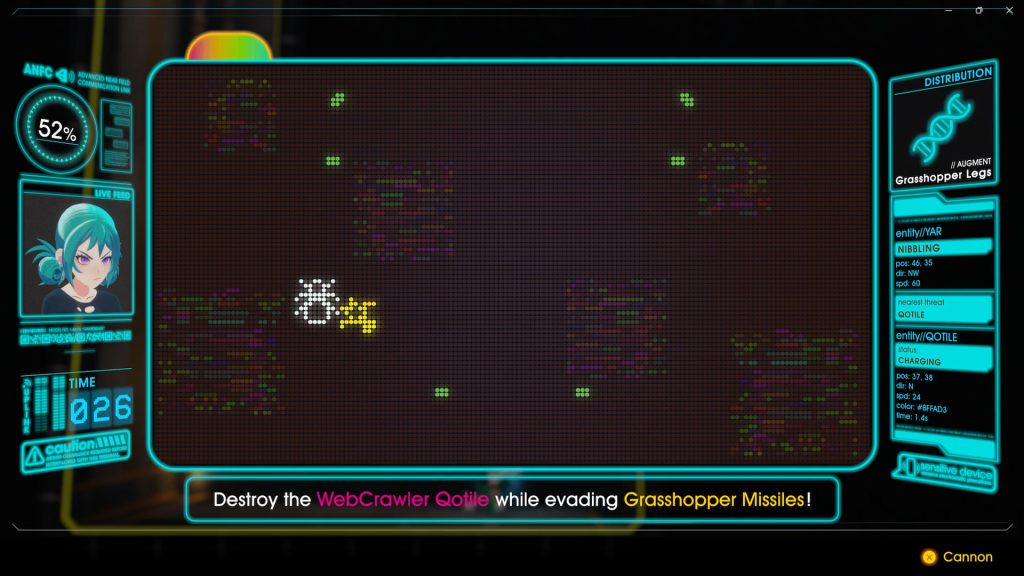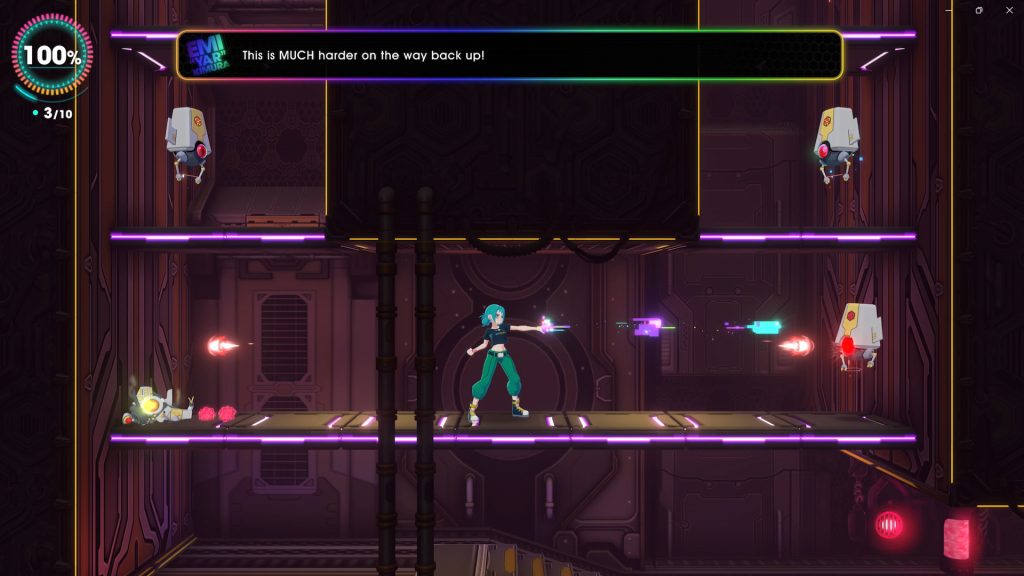The developers behind the Shantae series have crafted a wonderful tribute to the classic Atari 2600 game, Yars Revenge. Yars Rising is a blend of platforming with retro Atari gameplay, and it’s done using clever gameplay/story integration regarding the main character’s evolving augmentations. You save progress at arcade cabinets and get augments after clearing classic Yars stages, mixing the old with the new in neat ways. The game comprises Mega Man-esque run and gun sections, stealth, and backtracking in equal measure. WayForward is no stranger to platformers, and they’ve done a good job here, but Yars Rising isn’t without its flaws. Thankfully, it’s great to look at, so let’s start our deep dive there.
Yars Rising drew me into its world as soon as I saw its strikingly colorful art style. And the sharp colors aren’t just for show either, serving as a thematic evolution of the binary, yet strong color usage of the original Yars Revenge on the Atari 2600. The bold use of neon blues and pinks carries over into the menus and UI, oozing with stylish animations and cool little details. Speaking of animation, Emi and the supporting cast display a good amount of emotion and nuance considering how mid-budget this game is. Every new ability you get has a unique animation paired with it, and it all looks fluid and sleek in motion. Everywhere you look in Yars Rising will be pleasant for the eyes, but it’s also a feast for the ears.
Whether it’s the sea shanties of Shantae or the energetic beats of River City Girls, WayForward is known for their quality music. Yars Rising continues this trend with a disco-laced soundscape featuring a surprising amount of vocal tracks. I can’t express how absolutely ingrained a few of these tracks got in my head; they’ve been repeating since I started playing this for review and haven’t left since. The groovy music accompanies the high tech atmosphere of Qotech’s hallways well, and there’s even some in-game earbuds that tell you the track name and musician as the particular song plays.
“The map in Yars Rising tells you everything you need to know at a glance.”
You’ll be soaking in the rich sights and sounds of Yars Rising as you traverse a traditional platforming structure. Emi slowly adds more ‘Yar abilities’ to her arsenal, gaining her entry into previously closed off areas of the map. The map in Yars Rising is about as good as you can ask for. Everything you need to know is indicated at-a-glance. The floors of Qotech are easy to discern, with crystal clear color coding. Red areas indicate that you don’t have the abilities to enter that location yet, while white areas inform that you can go there. It’s a testament to the map and the area design that I never once got lost while navigating Qotech’s halls.
Though, there are some gripes that I have with the level design itself. For one, there’s not as many shortcuts or looping design elements as I’d expect from a platformer. If you want a shortcut, the only option is using the elevators, sparsely placed at the end of particular hallways. To compound the lack of interconnectivity is the complete omission of fast travel. I don’t need a fast travel in every platformer, but the rooms in Yars Rising are often separated by lengthy loading screens, making a fast travel option that much more necessary.
Regrettably, the pacing suffers significantly from these frequent loading screens. Backtracking isn’t as smooth or fun as it should be because every couple rooms or so greets you with another dreadful loading screen. Skipping levels by using the elevator can only alleviate so much, since that too is accompanied by a loading screen. At least you’re not backtracking too much in the game, as the path of the main story mostly tackles new rooms and environments. Aside from persistent loading times and a desire for more shortcuts, Yars Rising has a strong platforming structure that will satisfy most fans of the genre.
A platformer is nothing without solid controls, and Yars Rising satisfies on this front. Jumping is non-committal and precise, allowing for correction when your arc is leading to a laser or other obstacle. Your basic Zorlon Shot cannot be held down for automatic shooting though, requiring manual inputs to fire bullets. I didn’t mind manually tapping the shoot button, but other players may find the lack of an auto shoot irritating. I found the stealth to be rather fun. You can slowly tilt the control stick to slow walk, or press a trigger button to do so in a binary fashion. Enemy patrol units all outline predictable routes, making your sneaky infiltrations as irritant-free as possible. And if you miss a ledge above you, Emi will hang and mount up it if you’re close enough, so that’s another convenience.
“Death pits are indicated by purple mist. Yars Rising does a good job with its visual distinction.”
I also appreciate how conveniently color coded deadly pits are. I still encounter modern platformers that don’t distinguish between a death pit and an explorable area below; Yars Rising does this with its purple haze swirling around the deadly ones. The game exhibits great visual distinction across the board, with every missile and ledge boldly outlined for you to easily discern.
Emi does more than just run and jump though. Her augmented abilities open up new areas and bolster her offensive weaponry against the Qotile forces. Abilities are divided between Biohacks, which are small passive buffs, and new powers like wall jumping, which are Augments. You obtain both upgrade types by hacking a terminal and playing a creatively arranged stage from the classic Yar’s Revenge Atari game. The primary goal of these classic arcade minigames is to shoot the missile (usually located behind your Yar) at the opposing Qotile. This basic concept gets arranged in some really neat ways, always surprising and keeping me on my toes throughout the span of the main game. Oh, also, the UI for these minigames is staggeringly cool. The amount of info presented on the arcade UI while moving the little Yar around is insane, and the portrait of Emi reacting to her gameplay is wonderful. I simply loved playing these classic arcade games and found the gameplay variety between them and the normal platforming to be refreshing.

“The hacking minigames comprise fun variations on the classic Yar’s Revenge Atari game.”
If you want to just play the classic Yars game without all the modern platforming, there’s a mode in the main menu made just for that. Emi’s Hacklist compiles every Yars minigame found in Yars Rising and saves your high scores, making for good old fashioned retro fun. That said, if you’re not keen to play these classic Yars minigames at all, you can turn on minigame invincibility in the menu settings and get through them pretty quickly without much fuss. The Biohacks you earn from playing these minigames can be equipped by placing Tetris-like blocks on a Yar-shaped grid. The buffs allow you to customize your playstyle in flexible ways, granting you health increase, faster hacking minigame speed, or even a three-way Zorlon Shot.
Most of the footage for this review was taken during the early stages before acquiring the air dash or super missile Augments, so don’t let the basic run and gun moments fool you. By the second half of the game, you’ll be wall jumping, air dashing, and breaking through locked doors like nobody’s business. The game has some fun boss battles that require you to use your full arsenal of augmented abilities. These boss battles remind me of Mega Man robot masters in a way, but there’s only a total of 5 throughout the game, so they’re few and far between. But these augmented abilities do more than serve a combat role, they’re a core part of the game’s story.

“Emi is constantly quipping with voiced narration throughout the adventure”
As you could have guessed from the cover art, Emi’s bond with the ‘Yar’ species and her subsequent augmentations play a key role in the game’s story. What I didn’t expect was the sheer frequency of dialogue throughout the adventure, and all of it is voiced. Emi is constantly quipping about her circumstances, and plot beats never slow down throughout the game’s runtime. Thankfully, the voice acting is engaging and solid, but players may find Emi’s persistent sarcasm to be annoying after a while. Still, I can appreciate the fun and upbeat characters in this game; the voice direction helps liven up the experience even more, adding to the rich colors and popping soundtrack.
Yars Rising does a great job recontextualizing the Atari 2600 classic to a new generation. It provides a fun mix of old Yars gameplay with newer platforming concepts, all told through a narrative within a colorful world. There’s nothing particularly groundbreaking about the platforming aspects, and the game itself is over pretty quick, taking about 6 or so hours to complete for me. I’ve been enjoying my time collecting all the stuff I missed with my fully augmented character, but lament the persistent loading screens and lack of fast travel between save points. The loading really hampers traversal, making it cumbersome to backtrack and explore previously closed off areas. This cumbersome traversal is the fatal flaw in Yars Rising, which is a shame considering all of the other aspects it executes so well. Still, Yars Rising is a class act in its ability to fuse old with new, and its presentation quality shimmers with delight.
This game was reviewed on the PlayStation 5.






%20Abstract%20Background%20SOURCE%20Apple.jpg?w=150&resize=150,150&ssl=1)







